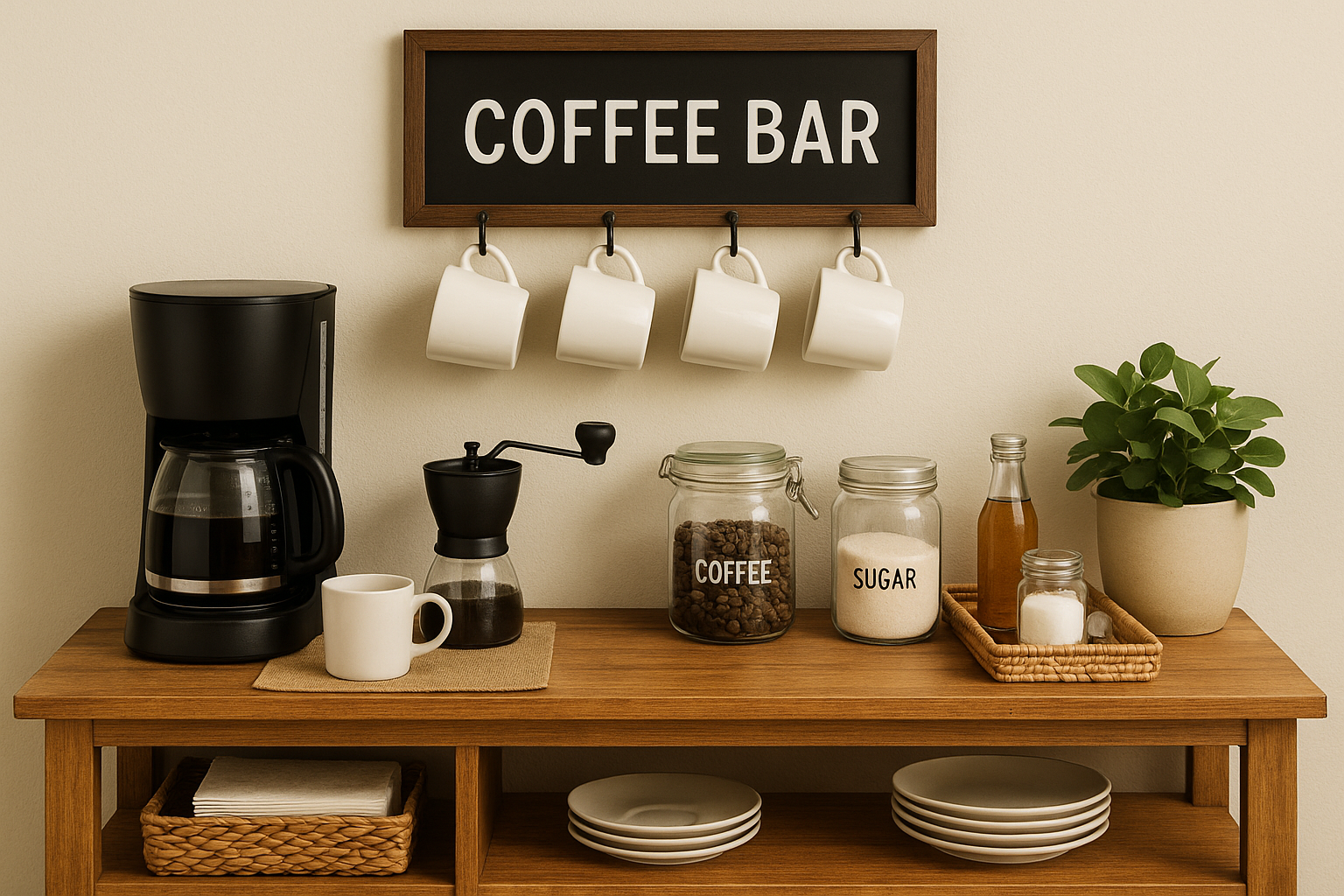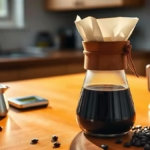Having your own coffee bar at home is more than just convenient—it’s a daily source of comfort, creativity, and savings. Whether you’re a casual coffee drinker or a passionate home barista, building a dedicated space for brewing your favorite drinks adds personality to your kitchen and elevates your coffee routine. The best part? You don’t need to spend a fortune to do it.
In this guide, you’ll learn how to create a beautiful, functional home coffee bar on a budget. From clever repurposing tips to space-saving layout ideas and affordable tools, this article will walk you through every step of transforming a small corner into your personalized café.
Why Set Up a Coffee Bar at Home?
A home coffee bar offers more than just aesthetic appeal. It also:
Saves you money by replacing daily café visits
Makes mornings more enjoyable and organized
Encourages creativity with new recipes and routines
Provides a dedicated space for storing and using your coffee tools
Adds a charming visual element to your kitchen or office
It’s an easy way to turn your daily caffeine habit into a moment of joy.
Step 1: Choose the Right Spot
You don’t need a large space or a separate room to create a cozy coffee nook. Start by identifying a practical, accessible spot.
Great options include:
A free kitchen countertop corner
An unused section of your dining room
The top of a small cabinet or dresser
A bar cart or rolling utility shelf
An empty sideboard or buffet
Look for a space near an electrical outlet if you plan to use electric coffee makers, grinders, or kettles.
Tip: Measure the area before buying anything to ensure your setup fits.
Step 2: Use Furniture You Already Have
Instead of buying a new cart or shelving unit, consider repurposing what you already own. Look around your home for:
Bookshelves or cube storage units
Small side tables or nightstands
Old TV stands or media consoles
Baker’s racks or rolling carts
Wall-mounted shelves for vertical setups
You can paint or decorate these pieces to match your style, giving them a second life as a charming coffee station.
Step 3: Gather Your Brewing Essentials
When building a coffee bar on a budget, it’s important to focus on essentials first, then gradually add extras.
Basic brewing tools:
A coffee maker (drip, French press, pour-over, or moka pot)
Coffee grinder (manual or electric)
Kettle (preferably with a gooseneck spout for precision)
Measuring spoon or scale
Your favorite mug(s)
Optional accessories:
Milk frother or whisk
Reusable coffee filters
Syrups or sweeteners
Spice shaker (for cinnamon, cocoa, or nutmeg)
Storage jars for beans and grounds
Don’t rush to buy everything at once. Start simple and upgrade slowly based on how you like your coffee.
Step 4: Organize Your Supplies
A tidy coffee bar is a functional coffee bar. Group similar items together and store them in accessible containers.
Here’s how to organize your station efficiently:
Use mason jars or glass containers for coffee beans, sugar, and stirrers
Add a small tray or basket to corral syrups, spoons, and accessories
Install hooks to hang mugs or tools
Label your containers for a clean, café-inspired look
Use vertical space with shelves or wall organizers
Tip: If space is limited, choose stackable containers and compact accessories.
Step 5: Add Affordable Decor and Personal Touches
Now it’s time to make your coffee station visually inviting. You don’t need expensive decorations—just a few creative touches can transform the space.
Budget-friendly ideas:
Use framed printable quotes about coffee
Hang a chalkboard for writing your “coffee of the day”
Decorate with fairy lights or LED strips
Place a small potted plant or succulent nearby
Use a woven basket to store napkins or pods
Your goal is to create a space that feels personal and makes you excited to brew.
Step 6: Keep It Stocked (Without Overspending)
To keep your coffee bar running smoothly without blowing your budget, plan ahead:
Buy beans in bulk or from local roasters
Grind your coffee fresh at home to save on pre-ground premium options
Use reusable filters and tools to avoid frequent repurchases
Try DIY syrups and creamers using basic pantry ingredients
Rotate seasonal flavors (like cinnamon in fall or peppermint in winter) to keep things fresh and exciting
Stock up during sales and buy only what you’ll actually use. Simplicity is the key to sustainability.
Best Budget Coffee Makers for Your Home Coffee Bar
If you’re just starting out or replacing an old machine, here are budget-friendly brewing methods to consider:
French Press – Affordable, easy to use, and makes bold coffee
Pour-Over Cone – Compact and inexpensive, with great flavor control
Moka Pot – A stovetop espresso-style brew with intense flavor
Drip Coffee Maker – Ideal for making multiple cups at once
Aeropress – Portable, fast, and perfect for small kitchens
Each method has its unique flavor profile, so choose based on how you enjoy your coffee.
How to Create a Coffee Bar in a Small Space
Even if you live in a studio or share a kitchen, you can still carve out a mini coffee nook.
Try these tips:
Use a single-shelf wall mount for mugs and beans
Choose a narrow utility cart you can roll away when not in use
Use hanging organizers or magnetic strips on the fridge or wall
Keep only one or two brewing tools out at a time
Rotate your supplies seasonally to match your habits
With a little creativity, even the tiniest kitchen can feel like a personal café.
Sample Layout: Budget Coffee Bar Checklist
To make setup easier, here’s a sample starter list you can customize:
Designated surface (table, cart, shelf)
Coffee maker (French press or pour-over)
Manual grinder or pre-ground coffee
Kettle or water source
Coffee beans in sealed jar
Mug or two
Measuring spoon or small digital scale
Napkins or paper towels
Tiny trash bin or compost container
Tray for organizing spoons, filters, or stirrers
As you grow your coffee habits, you can add extras like frothers, flavorings, and specialty tools.
Coffee Bar Themes and Styles (On a Budget)
If you want your station to have a specific vibe, here are a few fun and affordable themes you can recreate:
Rustic Café – Use wood trays, mason jars, burlap, and handwritten signs
Modern Minimalist – Choose black, white, or glass accessories with clean lines
Boho Coffee Corner – Add woven textures, greenery, and colorful mugs
Vintage Vibes – Display old-fashioned coffee tins or antique spoons
Seasonal Station – Decorate with mini pumpkins in fall or candy canes in winter
Most of these touches can be thrifted, DIYed, or printed at home.
Tips to Maintain Your Coffee Station
Once your home coffee bar is set up, keeping it clean and functional is essential.
Wipe down your surface daily to avoid stains or spills
Clean your grinder, coffee maker, and mugs regularly
Refill jars and containers before they run out
Keep cables and plugs neatly arranged
Rotate and check your coffee stock for freshness
Spending just five minutes a day maintaining your station keeps it looking good and working smoothly.
How Much Can You Really Save?
Let’s break it down.
If you buy one $5 café latte every day, that’s around $150 a month—or $1800 a year.
With a basic home setup (about $100 upfront), plus beans and milk (around $30/month), you’ll pay less than $500 annually.
That’s over $1300 in savings, not to mention the added comfort, convenience, and custom drinks you can enjoy any time.
Your coffee bar pays for itself in just a few months.
Fun Extras to Add Later (Optional)
Once the basics are covered and you’ve saved a little more, you can expand your setup with:
Electric milk frother
Espresso machine
Custom mugs or glassware
Built-in trash or compost bin
Mounted pegboard or wall rack
Specialty tools (tamper, distribution tool, thermometer)
None of these are essential, but they do enhance the experience as your passion grows.
Final Thoughts: A Café of Your Own
Creating a home coffee bar on a budget is about more than saving money—it’s about building a space that reflects your love for coffee, your personality, and your daily rhythm. With a bit of creativity, some repurposing, and intentional choices, you can enjoy café-quality moments at home, every day.
It doesn’t need to be perfect or expensive. Just functional, organized, and joyful.
Start small, personalize it as you go, and most importantly—enjoy every sip.

Rafael Souza is a digital marketing specialist and passionate coffee enthusiast. He founded Guiabebefeliz to share practical, easy-to-follow guides for making great coffee at home without needing professional barista skills. His mission is to help readers enjoy better coffee experiences, one cup at a time.






